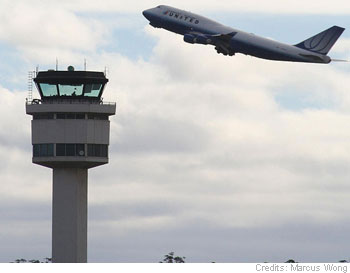 Today, the Senate turned to the Federal Aviation Administration authorization, H.R.1586. The last four-year authorization expired September 30, 2007. What caused this 2½ year delay? Congress couldn’t agree on how to apportion the excise and ticket taxes to pay for a desperately needed modernization of the air traffic control system.
Today, the Senate turned to the Federal Aviation Administration authorization, H.R.1586. The last four-year authorization expired September 30, 2007. What caused this 2½ year delay? Congress couldn’t agree on how to apportion the excise and ticket taxes to pay for a desperately needed modernization of the air traffic control system.
Your car has GPS. Your phone has GPS. Commercial airliners have GPS, but the air traffic control system still relies on radar and radio position reports. That costs billions of dollars in extra miles traveled every year. The airlines correctly believe they pay more than their fair share of the costs, but private pilots (I used to be one.) have more political clout and refuse to share more costs.
Then there’s the problem of Memphis, TN-based Fedex’s avoidance of a union for its workers, which puts it at an advantage over its main competitor, unionized United Parcel Service. The House version of H.R.1586 would apply existing labor laws equally to both companies, but that prompted Tennessee Senators Lamar Alexander (R-TN) and Bob Corker (R-TN) to hold up the bill. They relented when they concluded they have the votes to kill the bill before it goes to President Obama if it includes the Fedex (FDX) provision.
Airline objections to increased inspections of foreign repair shops are another hangup, as is a provision to publicize pilot performance information, and the killer — your yet to be enacted right to food, water, and a bathroom after getting stuck on the tarmac for 3 hours. As always, the traveler in me must trade off with the economist in me weighing the additional costs. I haven’t done the analysis, but the fuel and time savings from improved air traffic control would sure seem to outweigh the costs.
- Bulenox: Get 45% to 91% OFF ... Use Discount Code: UNO
- Risk Our Money Not Yours | Get 50% to 90% OFF ... Use Discount Code: MMBVBKSM
Disclaimer: This page contains affiliate links. If you choose to make a purchase after clicking a link, we may receive a commission at no additional cost to you. Thank you for your support!


Leave a Reply